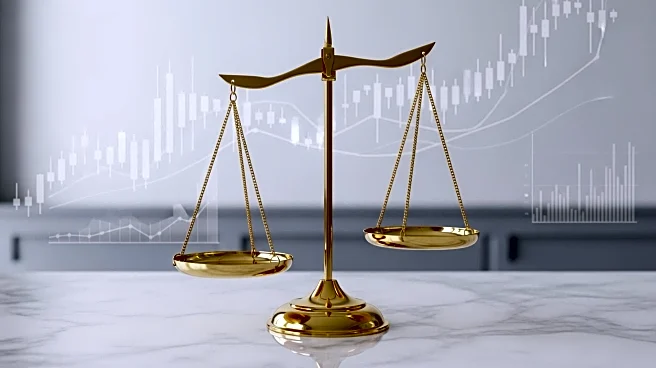What's Happening?
The Central Bank of the Russia Federation has reduced its key interest rate to 16.5 percent and revised its economic growth forecast for 2025 to between 0.5 to 1 percent. This decision comes as Russia's economy faces significant challenges from high inflation
and extensive Western sanctions. The sanctions, particularly those imposed by the U.S. on major Russian oil suppliers Rosneft and Lukoil, have severely impacted the country's economic output, as oil and gas constitute a significant portion of Russia's GDP. Despite the rate cut, the central bank anticipates inflation to rise next year, projecting it to be between 4 to 5 percent. The bank's statement highlighted increasing inflationary pressures due to tax hikes, trade disruptions, and oil price fluctuations, with geopolitical tensions adding to the uncertainty.
Why It's Important?
The central bank's actions reflect the severe economic strain Russia is under due to international sanctions, particularly from the U.S. The sanctions on Rosneft and Lukoil are significant as they target a critical sector of Russia's economy. The reduction in the interest rate is an attempt to stimulate economic activity, but the anticipated rise in inflation could offset these efforts. The situation underscores the broader geopolitical tensions affecting global markets and highlights the interconnectedness of international economic policies. The outcome of these measures will be closely watched by global economic stakeholders, as they could influence international trade dynamics and economic stability.
What's Next?
The central bank's decision may lead to further economic adjustments as Russia navigates the challenges posed by sanctions and inflation. Stakeholders, including businesses and policymakers, will likely monitor the situation closely to assess the effectiveness of the rate cut. The potential for further geopolitical developments could also impact future economic policies. Additionally, the international community will be observing Russia's economic strategies and their implications for global economic relations.
Beyond the Headlines
The economic measures taken by Russia's central bank highlight the complex interplay between domestic economic policies and international geopolitical pressures. The focus on inflation control versus economic growth presents a dilemma for policymakers, reflecting broader challenges faced by countries under sanctions. The situation also raises questions about the long-term sustainability of Russia's economic model, heavily reliant on oil and gas exports, in the face of shifting global energy dynamics.
















